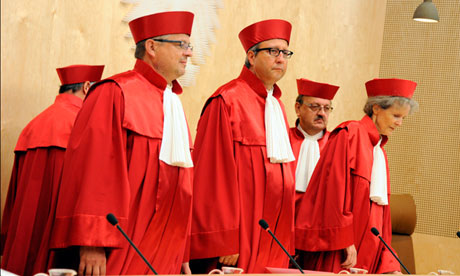
Judges at the German
constitutional
court in Karlsruhe, whose decision
allows the European
Stability
Mechanism to go ahead. Photograph:
Uli Deck/AFP/Getty Images
Germany's
highest court has paved the way for the creation of a €500bn(£400bn)
rescue fund to tackle the eurozone's debt crisis after a huge popular
petition to block it was rejected.
The decision by the eight justices of the constitutional court in the south-western city of Karlsruhe allows Germany to ratify the treaty to establish the European stability mechanism (ESM) and will enable it to become effective next month. But an important condition attached to the ruling means that Germany's liabilities will be capped at €190bn, unless parliament rules otherwise.
The limitation will go some way to assuage the concerns of German taxpayers whose frustration at the prospect of having to bail out indebted southern European countries indefinitely has been on the rise. A poll before the ruling showed that 54% of Germans wanted the court to block the ESM.
Markets reacted positively to the decision with the euro reaching a four-month high, after the conditions imposed by the court, which had been widely expected to reject calls to block the fund, were less burdensome than German parliamentarians and other ESM supporters had feared.
The German chancellor, Angela Merkel, for whom the ruling is a personal breakthrough, allowing the
go-ahead of the two-pronged approach of both bailouts and budgetary discipline in the form of the fiscal pact that she has consistently advocated, said the decision sent a strong signal of Germany's commitment to Europe, and was positive news for the German taxpayer. Addressing the Bundestag she said: "This is a good day for Germany and a good day for Europe."
Frank-Walter Steinmeier, leader of the opposition Social Democrats, expressed his relief that the ESM, whose creation had been substantially delayed by the constitutional court's deliberations, could now start to work. "The significance of this decision for the future of Europe cannot be overestimated," he told the Bundestag.
The court had been under huge pressure not to torpedo the ESM, amid fears that it would cause the destruction of the euro and have a chaotic effect on the global economy. Andreas Vosskuhle, the court's president, said "the economic and political consequences" of delaying the law's introduction were "almost impossible to calculate reliably".
A little light relief amid the gravitas of an occasion which amounted to the most important ruling in the court's 61-year history was offered by a slip of the tongue by Vosskuhle who called the petitions to block the ESM "justified" before changing it to "unjustified" after being corrected by a colleague, as peals of laughter filled the courtroom.
Kate Connolly in Berlin
Source
The decision by the eight justices of the constitutional court in the south-western city of Karlsruhe allows Germany to ratify the treaty to establish the European stability mechanism (ESM) and will enable it to become effective next month. But an important condition attached to the ruling means that Germany's liabilities will be capped at €190bn, unless parliament rules otherwise.
The limitation will go some way to assuage the concerns of German taxpayers whose frustration at the prospect of having to bail out indebted southern European countries indefinitely has been on the rise. A poll before the ruling showed that 54% of Germans wanted the court to block the ESM.
Markets reacted positively to the decision with the euro reaching a four-month high, after the conditions imposed by the court, which had been widely expected to reject calls to block the fund, were less burdensome than German parliamentarians and other ESM supporters had feared.
The German chancellor, Angela Merkel, for whom the ruling is a personal breakthrough, allowing the
go-ahead of the two-pronged approach of both bailouts and budgetary discipline in the form of the fiscal pact that she has consistently advocated, said the decision sent a strong signal of Germany's commitment to Europe, and was positive news for the German taxpayer. Addressing the Bundestag she said: "This is a good day for Germany and a good day for Europe."
Frank-Walter Steinmeier, leader of the opposition Social Democrats, expressed his relief that the ESM, whose creation had been substantially delayed by the constitutional court's deliberations, could now start to work. "The significance of this decision for the future of Europe cannot be overestimated," he told the Bundestag.
The court had been under huge pressure not to torpedo the ESM, amid fears that it would cause the destruction of the euro and have a chaotic effect on the global economy. Andreas Vosskuhle, the court's president, said "the economic and political consequences" of delaying the law's introduction were "almost impossible to calculate reliably".
A little light relief amid the gravitas of an occasion which amounted to the most important ruling in the court's 61-year history was offered by a slip of the tongue by Vosskuhle who called the petitions to block the ESM "justified" before changing it to "unjustified" after being corrected by a colleague, as peals of laughter filled the courtroom.
Kate Connolly in Berlin
Source

No comments:
Post a Comment